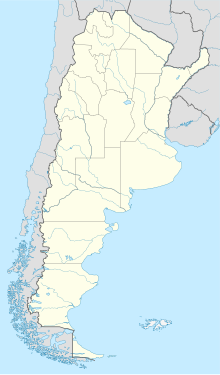| Location | |
|---|---|
| Province | Catamarca Province |
| Country | Argentina |
| Coordinates | 27°19′50″S 66°36′30″W / 27.330651°S 66.608403°W |
| Production | |
| Products | Gold and copper |
| Type | Open pit |
| History | |
| Opened | 1997 |
| Closed | 2018 |
| Owner | |
| Company | Minera Alumbrera |
| Website | www |
Bajo de la Alumbrera mine was a gold and copper mine in the Catamarca Province, of Argentina. It was the largest and the oldest open pit mine in Argentina.
The mine opened in 1997 and was met with local opposition before complaints about environmental pollution. The mine closed in 2018.
Description
Bajo de la Alumbrera mine was a gold and copper mine in the Catamarca Province, of Argentina.[1] It is located 70 kilometres west of Andalgalá[1] and cost $1.2 billion to open.[2]
It is the largest and the oldest open pit mine in Argentina.[1][3] In 2000, the mine was the fourteenth largest gold mine in the world and the ninth largest copper mine.[2]
The mine had 648 million metric tons of 0.54% copper and gold at 0.67 grams per metric ton.[2]
The mine uses cyanide and sulphuric acid to extract the copper and gold from the ore. It uses between 60 million and 100 million litres of water per day. The mine produces 314,000 tons of ore daily, which is mixed with water into mud that is piped 216 kilometres to San Miguel de Tucumán. In Tucumán, the mud is dried and concentrated before being moved by train to the Port of Rosario for separation and smelting outside Argentina.[1]
A 930 hectare tailing pond captures mine effluent.[1]
History
The mine opened in 1997, the first open pit mine in Argentina at the time. The mine's opening was met with complaints from activist, academics and the media. Although disputed by the mine's owners, Minera Alumbrera [ES], accusations linking the mine's activities to land, air occurred.[4] In 2009, Minera Alumbrera was jointly owned by Xstrata, Goldcorp, Northern Orion Resources, and the Argentinian government owned company: Mineral Deposits of the Waters of Dionysius.[1]
In 2008, the mine's owners were investigated for corruption, environmental criminality and gold smuggling.[1]
The 2009, 2010, and 2011 sustainability report published by the mine's owners downplayed environmental concerns raised about the mine. In 2011 and 2012, local community members protested the mine, including blocking the National Route 40 near Belén in May 2012. Protests were stopped by police without any dialogue with mine owners.[4]
The mine stopped operating at the end of 2018.[5] By 2018, the nearby Andalgalá community had successfully campaigned to halt the opening of the nearby Agua Rica mine for eight years.[6]
Environmental impact
The mine's water consumption is the cause of desertification and activists have reported five leaks from the mine's pipelines. The water removed from the mud in Tucumán goes into the DP2 canal before reaching the Sali-Dulce river. The river is without plant and fish life. The canal has copper and arsenic at 20,000 the legal limit and levels of cadmium 5,000 times and mercury 10,000 times the legal limit, according to Bajo Alumbrera activist organization.[1]
References
- ^ a b c d e f g h Robertson, Cole (2009-09-18). "Alumbrera, Producer of Riches, Poison and Corruption". The Tyee. Archived from the original on 2023-05-09. Retrieved 2023-06-29.
- ^ a b c Carmelo, Rafaela Manzan; De Benedicto, Samuel Carvalho (March 2023). "RESPONSABILIDADE SOCIOAMBIENTAL CORPORATIVA: EM BUSCA DE UM ALINHAMENTO DAS ESTRATÉGIAS EMPRESARIAIS COM OS OBJETIVOS DO DESENVOLVIMENTO SUSTENTÁVEL" [CORPORATE SOCIAL AND ENVIRONMENTAL RESPONSIBILITY: IN SEARCH OF AN ALIGNMENT OF BUSINESS STRATEGIES WITH THE OBJECTIVES OF SUSTAINABLE DEVELOPMENT]. Revista SODEBRAS (in Portuguese). 18 (207): 17–29. doi:10.29367/issn.1809-3957.18.2023.207.17. S2CID 257918602.
- ^ Aranha, Michal (19 April 2022). "Why this artist made an 'open-pit gold mine' fragrance". CBC. Archived from the original on 31 May 2023. Retrieved 29 June 2023.
- ^ a b Murguía, Diego I.; Böhling, Kathrin (February 2013). "Sustainability reporting on large-scale mining conflicts: the case of Bajo de la Alumbrera, Argentina" (PDF). Journal of Cleaner Production. 41: 202–209. doi:10.1016/j.jclepro.2012.10.012.
- ^ "Futuro Sustentable - La #Mina a cielo abierto Bajo de la Alumbrera prepara su cierre". Archived from the original on 16 September 2016. Retrieved 6 September 2016.
- ^ Serafini, Paula (2018-05-04). "The Argentinian fight against 'mega mining'". The Conversation. Archived from the original on 2023-05-23. Retrieved 2023-06-29.
Further reading
- Porta, Mario Pasco Dalla (2019). The Coercion/Dialogue Paradox in Mining Conflicts in Argentina and Peru (Thesis). ProQuest 2272213323.









